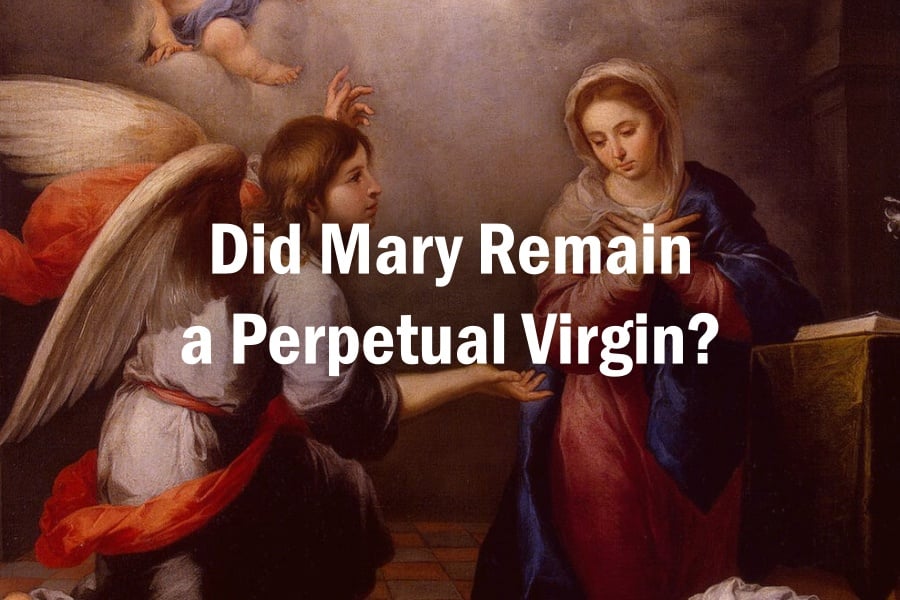Now the birth of Jesus Christ was like this; for after his mother, Mary, was engaged to Joseph, before they came together, she was found pregnant by the Holy Spirit. (Matthew 1:18, WEB)
With the exception of some liberal scholars, Christianity has always maintained that Jesus was born of a virgin. However, much of Christianity is divided over whether Mary remained a virgin after giving birth to Jesus. Roman Catholics and Eastern Orthodox, along with some Anglicans and Lutherans, believe that she did remain a virgin, but for the most part, Protestants deny it.
On the one hand, I’m tempted to say that it doesn’t matter one way or another. Why should Mary’s sex life be any of my business?
On the other hand, up until the Protestant Reformation, the church was largely united on this matter that has now become a source of division. Many Protestants use this as an excuse to dismiss the more historically based branches of the church for their “silly” beliefs.
So let me be clear. I really don’t care whether you believe Mary remained a perpetual virgin. But I care deeply about Christian unity, and I want us to stop using such beliefs to dismiss or divide from our brothers and sisters in Christ. To that end, I’m going to try to explain this belief held by so many Christians, in the hopes that greater understanding will help promote greater unity—regardless of your personal view.
Disclosure: I am neither Roman Catholic nor Eastern Orthodox (despite some theological influence from the latter). Therefore, while I’ll do my best to summarize this belief accurately, I claim no authority on the matter, and I apologize in advance for any errors I may introduce.
For myself, I never understood the idea of Mary’s perpetual virginity until I took a look at the apocryphal book known as the Protevangelium of James (which you can read online). Don’t let the word apocryphal concern you—it just means that the book was never accepted as Scripture. It does not mean that the book is dangerous, nor that it is without historical merit. It’s a profitable book; it just isn’t Scripture.
The Protevangelium of James is believed to have been written around AD 145 (just a few decades after the final books of the New Testament were completed), and it almost certainly was not written by James the Apostle. However, it was very popular in the early church, and the explanations it provides are plausible enough that we ought to give them serious consideration.
According to this book, Mary’s parents, Anna and Joachim, had been unable to conceive. Anna prayed to God and begged him to give her a child. An angel then appeared and told Anna that her prayers had been answered and she would bear a child. In response—perhaps inspired by another Anna, the mother of Samuel—Anna promised that her child would be dedicated to God’s service for all of his or her life.
Just as the angel had said, Anna conceived and gave birth to a child—Mary. And just as Anna had promised, she devoted Mary to the service of God in the temple. Among other things, this devotion to temple service meant that she was under an oath to remain a virgin for all of her life.
As she grew older, a caretaker was needed for Mary—someone who would become her husband in the legal sense but would honor her oath of virginity. The high priest assembled all the widowers of the people and asked God for a sign as to which man should take Mary as his wife. The sign pointed to Joseph, who initially refused, saying that he had children and was already an old man. But with some persuasion, he accepted Mary as his betrothed wife.
You know the rest of the story from here.
As I said initially, the Protevangelium of James is apocryphal, so you don’t have to accept the things it says. However, if you’re willing to entertain it as a possibility, it provides good explanations for some questions raised by the Gospels themselves.
For example, when the angel told Mary that she would conceive a son, she responded by asking, “How shall this be, seeing I know not a man?” (Luke 1:34, KJV). Why would she ask this? She was already betrothed to Joseph (Luke 1:27). Wouldn’t she have simply assumed that she would conceive with Joseph after they were married?
You may have noticed that I quoted the KJV above (not something I often do). Modern versions tend to obscure Mary’s question, often putting it in past tense: “How will this be, since I have not had sexual relations with a man?” (Luke 1:34, NET). But the KJV gets it right in this case. The Greek verb is in present tense. Mary wasn’t referring to her past experience or lack thereof; she was referring to her oath as one who would never know a man. Only after the angel assured Mary that she would not have to break her oath did she consent to what would happen (Luke 1:35–38).
The Protevangelium of James also explains Joseph’s absence throughout Jesus’ adult life. If he was already an old man when Jesus was born, he would have probably died before Jesus started his ministry.
It also explains the mentions of Jesus’ brothers and sisters (Matthew 13:55–56; John 7:5; etc.). They were his half siblings, fathered by Joseph from his previous marriage. [Another proposal is that brothers and sisters should instead be translated cousins. This is possible, but I personally find it less convincing.]
Furthermore, it explains why Jesus, while on the cross, would tell John to care for Mary as his mother (John 19:26–27). Though she had stepchildren, they would have been around her own age or older, and she had no other biological children to care for her.
Two additional objections bring us back to our passage in Matthew.
Joseph, her husband, being a righteous man, and not willing to make her a public example, intended to put her away secretly. But when he thought about these things, behold, an angel of the Lord appeared to him in a dream, saying, “Joseph, son of David, don’t be afraid to take to yourself Mary, your wife, for that which is conceived in her is of the Holy Spirit. She shall give birth to a son. You shall call his name Jesus, for it is he who shall save his people from their sins.”
Now all this has happened, that it might be fulfilled which was spoken by the Lord through the prophet, saying,
“Behold, the virgin shall be with child,
and shall give birth to a son.
They shall call his name Immanuel”;
which is, being interpreted, “God with us.”Joseph arose from his sleep, and did as the angel of the Lord commanded him, and took his wife to himself; and didn’t know her sexually until she had given birth to her firstborn son. He named him Jesus. (Matthew 1:19–25, WEB)
The objections concern the words until and firstborn. Some say that the word until implies that Joseph did know Mary after Jesus was born. Likewise, some say that the word firstborn implies that other children were born later.
I’ll just give a quick response here. Though the English translation might seem to imply these things, neither the English nor the Greek demands them. Until simply describes what happened before the birth; it does not say anything about what happened after. And firstborn describes the legal status of the first child, regardless of whether other children were ever born.
Finally, I’d like to briefly consider the history of this belief. The perpetual virginity of Mary was held by such church fathers as Irenaeus, Origen, Athanasius of Alexandria, Gregory of Nyssa, John Chrysostom, Jerome, and Augustine of Hippo, to name just a few. It was explicitly affirmed in the Lateran Council of 649, and again in the sixth ecumenical council in 680. It was then universally held by the church until the time of the Protestant Reformation.
Even then, many Protestant reformers such as Martin Luther and Huldrych Zwingli affirmed it, and John Calvin, though more cautious, was generally in favor of the belief. Some Anabaptists such as Balthasar Hubmaier affirmed it. Anglican reformers such as Hugh Latimer and Thomas Cranmer also affirmed it. Even John Wesley, centuries after the Reformation, explicitly affirmed his belief in Mary’s perpetual virginity.
Now I know what some of you are thinking. Majority of opinion does not necessarily make a belief correct. I’ll grant that. But such an overwhelming majority of the greatest theologians throughout church history should at least give us pause before dismissing the belief offhand.
But I’ll leave it there for now. As I stated earlier, it’s not my intention to convince you of this belief; I just want to help you understand it a little better. To that end, I hope I have succeeded.
This is the third post in my “Blogging through Matthew” series. If you missed the previous post, be sure to check out “Matthew’s Subversive Genealogy of Jesus.”

















